- Home
- Martin Amis
Night Train Page 6
Night Train Read online
Page 6
“No.”
“You talk to Trader?”
“I didn’t tell Trader. With Trader I kind of talked around it. But no. No! Jennifer? Who do you know as steady as her?”
Yeah, but people do things without people knowing. People kill, bury, divorce, marry, change sex, go nuts, give birth, without people knowing. People have triplets in the bathroom without people knowing.
“Mike, it’s funny, you know? I’m not saying it’s any better. But with this we turned some kind of corner.”
“Colonel Tom?”
“He’s back. I thought we’d lost him there. But he’s back.”
Miriam swiveled. There he stood, her husband: The heavy underlip, the scored orbits. Like he was on lithium now. His mood was stabilized. He was gazing, steadily, through the universal fog.
“See, Mike, we were looking for a why. And I guess we found one. But suddenly we don’t have a who. Who was she, Mike?”
I waited.
“Answer that, Mike. Do it. If not you, who? Henrik Overmars? Tony Silvera? Take the time. Tom’ll push you some compassionate. Do it. It has to be you, Mike.”
“Why?”
“You’re a woman.”
And I said yes. I said yes. Knowing that what I’d find wouldn’t be any kind of Hollywood ketchup or bullshit but something absolutely somber. Knowing that it would take me through my personal end-zone and all the way to the other side. Knowing too—because I think I did know, even then—that the death of Jennifer Rockwell was offering the planet a piece of new news: Something never seen before.
I said, “You’re sure you want an answer?”
“Tom wants an answer. He’s a police. And I’m his wife. It’s okay, Mike. You’re a woman. But I think you’re tough enough.”
“Yeah,” I said, and my head dropped. I’m tough enough. And getting less proud of it every hour.
She turned again toward the waiting figure of her husband, and slowly nodded. Before she moved to join him, and before I followed with my head still down, Miriam said,
“Who the hell was she, Mike?”
I think we all have this image in our heads now, and the sounds. We have these frames of film. Tom and Miriam have them. I have them. In the small interrogation room I watched them form on the other side of Trader’s eyes—these frames of film that show the death of Jennifer Rockwell.
You wouldn’t see her. You’d see the wall behind her head. Then the first detonation, and its awful flower. Then a beat, then a moan and a shudder. Then the second shot. Then a beat, a gulp, a sigh. Then the third.
You wouldn’t see her.
Part Two. FELO DE SE
THE PSYCHOLOGICAL AUTOPSY
Suicide is the night train, speeding your way to darkness. You won’t get there so quick, not by natural means. You buy your ticket and you climb on board. That ticket costs everything you have. But it’s just a one-way. This train takes you into the night, and leaves you there. It’s the night train.
Now I feel that someone is inside of me, like an intruder, her flashlight playing. Jennifer Rockwell is inside of me, trying to reveal what I don’t want to see.
Suicide is a mind-body problem that ends violently and without any winner.
I’ve got to slow this shit down. I’ve got to slow it all down.
What I’m doing here, with my ballpoint, my tape recorder, and my PC—it’s the same as what Paulie No was doing in the ME’s office, with his clamp, his electric saw, his trayfull of knives. Only we call it the psychological autopsy.
I can do this. I am trained to do this.
Recall:
For a time, though only a short time, and only once to my face, they used to call me “Suicide Mike.” This was thought to be too offensive, even for downtown, and they soon abandoned it. Offensive not to the poor bastards found slumped in carseats in sealed garages, or half submerged in crimson bathtubs. Offensive to me: It meant I was fool enough to take any bum call. Because a suicide didn’t do a damn thing for your solve rate or your overtime. On the midnights the phone would ring and Mac or O’Boye would be pouting over the cupped receiver and saying, How about you handle this one, Mike? It’s an s.d. and I need dough for my mother’s operation. A suspicious death—not the murder he craves. For little-boy-lost here also believes that suicides are an insult to his forensic gifts. He wants a regular perpetrator. Not some schmuck who, a century ago, would have been buried at the four-corners, under a heap of rocks, with a stake through his heart. Then for a time—a short time, as I say—they’d hold out the phone and deadpan, It’s for you, Mike. It’s a suicide. And then I’d yell at them. But they weren’t wrong, maybe. Maybe it moved and compelled me more than it did them, to crouch under the bridge on the riverbank, to stand in a rowhouse stairwell while a shadow rotated slowly on the wall, and think about those who hate their own lives and choose to defy the terrible providence of God.
As part of my job I completed, as many others did, the course called “Suicide: Harsh Conclusions,” at Pete, and followed that up, again on city time, with the refresher lecture series on “Patterns of Suicide,” at CC.
I came to know the graphs and diagrams of suicide, their pie segments, their concentric circles, their color codes, their arrows, their snakes and ladders. With my Suicide Prevention tours, back in the Forty-Four, plus the hundred-some suicides I worked in the Show, I came to know not just the physical aftermaths but the basic suicide picture, ante mortem.
And Jennifer doesn’t belong here. She doesn’t belong.
I have my folders out on the couch, this Sunday morning. Going through my notes to see what I got:
· In all cultures, risk of suicide increases with age. But not steadily. The diagonal graph-line seems to have a flattish middle section, like a flight of stairs with a landing. Statistically (for what stats are worth around here), if you make it into your twenties, you’re on level ground until the risk bump of the midlife. Jennifer was twenty-eight.
· About 50 percent of suicides have tried before. They are parasuicides or pseudosuicides. About 75 percent give warning. About 90 percent have histories of egression—histories of escape. Jennifer hadn’t tried before. So far as I know, she did not give warning. All her life she saw things through.
· Suicide is very, very means-dependent. Take the means away (toxic domestic gas, for instance) and the rate plummets. Jennifer didn’t need gas. Like many another American, she owned a gun. These are my notes. What about their notes, and what percentage leave them? Some studies say 70 percent, others say 30. Suicide notes, it is assumed, are often spirited away by the decedent’s loved ones. Suicides, as we have seen, are often camouflaged—smudged, snowed. Axiom: Suicides generate false data. Jennifer, apparently, did not leave a suicide note. But I know she wrote one. I just feel this.
It may run in families but it’s not inherited. It is a pattern, or a configuration. It’s not a predisposition. If your mother kills herself, it won’t help, and it opens a door...
Here are some other do’s and don’ts. Or don’ts, anyway:
Don’t work around death. Don’t work around pharmaceuticals.
Don’t be an immigrant. Don’t be a German, just off the boat.
Don’t be Romanian. Don’t be Japanese.
Don’t live where the sun doesn’t shine.
Don’t be an adolescent homosexual: One in three will attempt.
Don’t be a nonagenarian Los Angelean.
Don’t be an alcoholic. It’s suicide on the installment plan, anyway.
Don’t be a schizophrenic. Disobey those voices in your head.
Don’t be depressed. Lighten up.
Don’t be Jennifer Rockwell.
And don’t be a man. Don’t be a man, whatever you do. Tony Silvera was, of course, talking through his ass when he said that suicide was “a babe thing.” To the contrary, suicide is a dude thing. Attempting is a woman thing: They’re more than twice as likely to do that. Completing is a man thing: They’re more than twice as likely to do tha
t. There’s only one day in the year when it’s safer to be male. Mother’s Day.
Mother’s Day is the day for felo de se. How come? I wonder. Is it the all-you-can-eat brunch at the Quality Inn? No. The suicides are the women who skipped the lunch. They’re the women who skipped the kids.
Don’t be Jennifer Rockwell.
The question is: But why not?
STRESSORS AND PRECIPITANTS
The first person I’m going to be wanting to talk to is Hi Tulkinghorn—Jennifer’s physician. Over the years I’ve come across this old party a bunch of times at the Rockwells’ (barbecues, cocktails on Christmas Eve). And, recall, Colonel Tom had him in to look me over, when I was drying out there: DT-ing for a week in one of the children’s bedrooms on the first floor. Which I don’t remember a whole lot about. Small, bald, clean-eyed, Tulkinghorn’s the kind of elderly medic who, over time, seems to direct more and more of his doctoring know-how inward—to keep his own little show on the road. The other kind of elderly medic is a drunk. Or he’s drying out. When I was drying out, Jennifer used to come into the room in the evenings. She’d sit in the corner and read to me. She’d feel my brow and fetch me water.
Now. I had called Tulkinghorn’s office on March eighth, almost two weeks ago. And how about this. The old prick was on a poker cruise in the Caribbean. So I had his secretary page him and he came squawking in from The Straight Flush. Told him the news and said I was following up on it. He said to make an appointment. I called his office again, and got talking. It turned out that it isn’t Tulkinghorn who plays poker. It’s his wife. He gets nice and tan on a lounger—while she’s crouching at a table in the saloon, blowing the second home on her two pair.
Hi Tulkinghorn works out of a gothic apartment block near Alton Park, over in the Thirty-Seven. I sat there in the narrow corridor, like a patient, with an ear-sufferer on one side of me and a throat-sufferer on the other. The parched secretary sat in her cubbyhole pushing paper around and answering the phone: “Doctor’s office?” Younger guys in smocks, like interns, sloped in and out with clipboards and vials. Walls of folders and binders, floor to ceiling: What? Fading biopsy reports. Dust-coated urinalyses. Mr. Ear and Mr. Throat both groaned raggedly when the woman nodded me through. I passed from the corridor shadows into the Germanic tang of Tulkinghorn’s surgery and the usual smell of mouthwash.
I’d like to be able to say that Hi’s tan made him look like death warmed up. But he just twinkled away, self-sufficiently enough, there behind his desk. Now, this I do remember. When I was hallucinating, in the little room at Colonel Tom’s, visited by visitors, some of them real, some of them not, and wondering how the hell I was going to get through the next half hour, I’d sometimes think: I know. I’ll fuck one of these ghosts. That’ll kill some time. But I didn’t want to fuck Hi Tulkinghorn. He has too much death knowledge, soberly absorbed, in his pale blue eyes. Careful here. Don’t say Hi.
“Doctor.”
“Detective. Take a seat.”
“How was the cruise? Your wife make money?”
“She broke about even. I’m sorry I missed the funeral. I tried to get a flight from Port of Spain. I’ve talked with Colonel and Mrs. Rockwell. I’ll be doing what I can there.”
“Then you know why I’m here.”
We paused. I opened my notebook and looked down at the page. I was suddenly very impressed by my jottings of the night before. Which said: Nature of the disorder: Reactive/non-reactive? Affective/ideational? Psychological/organic? From within or without? I began:
Dr. Tulkinghorn, what kind of patient was Jennifer Rockwell?
... She—she wasn’t.
Excuse me? What was her medical history?
She didn’t have one.
I don’t follow.
As far as I’m aware she never had a day’s illness in her life. Except of course in infancy. Her checkups were a joke.
When was the last time you saw her?
Saw her here? About a year ago.
Was she under the care of anybody else?
I’m not sure I understand. She had a dentist, and a gynecologist, a Dr. Arlington. She’s a friend of mine. Same story there. As a specimen Jennifer was close to phenomenal.
Then why was she on lithium, Doctor?
Lithium? She was not on lithium, Detective.
See this? This is Toxicology. She have a psychiatrist?
Certainly not. I’d have been notified—you know that.
He took the Xeroxed sheet from my hand and surveyed it with indignation. With quiet indignation. I knew what he was thinking. Already, he was thinking: If she didn’t get it from a professional, then where did she get it? The next thought being: You can get anything in this city—easy. Yeah, tell me about it. And not from a hoody on a corner but from a smiling piece of shit in a labcoat. The names of the drugs out there can run on for twenty-five syllables... A silence followed. A silence of the kind that must be pretty frequent, in his line of work. In delivery rooms, over test results, in the reflected light of X-ray screens. And then Dr. Tulkinghorn gave up on Jennifer. With the slightest flex of his shoulders, he let Jennifer Rockwell go.
Yes, well. At least you’re getting a pattern here. She was medicating her own head. That’s always delusional.
How so?
It’s like mental hypochondria. Psychotropic drugs would tend to intensify that. You’d get a spiral effect.
Tell me, Doc: How surprised were you when you heard?
Surprised. Surprised. Oh, sure. And I was sick for Tom and Miriam. But at my age. In this profession. I’m not sure I’m capable... of astonishment.
And I wanted to say: You guys kill yourself a lot, don’t you. You do: Your rate is three times higher than Joe Shmoe’s. Shrinks top the list at six times higher. Then, in descending order, you got vets, pharmacists, dentists, farmers, and doctors. What’s the connection here, I wonder. Exposure to the natural processes of death, disease, and decay, maybe. Or just exposure to suffering—often dumb suffering. And availability of means. The studies talk about “role strain.” But police have role strain too. And although we’re prone to suicide, we’re nothing like these fucking kamikazes in their sky-blue smocks. Retirement time sees all of us most at risk. I think it’s to do with power. With the daily exercise of power and what happens to you when it’s taken away.
I looked up from my notes. Something shifted in Tulkinghorn’s focus. He contemplated me. I was no longer his interrogator. I was Detective Mike Hoolihan, whom he knew: A police and an alcoholic. And a patient. His washed eyes now regarded me with approval, but a cold approval, one that gave no lift to the spirit. To his or to mine.
“You’ve kept yourself in shape, Detective.”
“Yes, sir.”
“No recurrences of that nonsense.”
“None.”
“Good. You’ve seen just about everything too, haven’t you?”
“Just about. Yes, sir, I believe I have.”
When I got back home I dug out the list I’d compiled on my return from the funeral. Briskly, boldly, this list is headed, Stressors and Precipitants. But what follows now seems vague as rain:
1. Significant Other? Trader. Things he didn’t see?
2. Money?
3. Job?
4. Physical Health?
5. Mental Health? Nature of disorder: a. psychological? b. ideational/organic? c. metaphysical?
6. Deep Secret? Trauma? Childhood?
7. Other Significant Other?
Now I cross out 4. Which leaves me wondering what I mean by 5 c). And thinking about 7. Is Mr. Seven her lithium connect?
A SENSE OF AN ENDING
Death scenes are as delicate as orchids. Like death chemistry itself, they seem committed to the business of deterioration and decay. But my death scene has eternal youth. It still has the sash on the door. Do Not Cross. I cross.
The blood on the bedroom wall looks black now, with just the faintest undercoat of rust. At the top of the splatter, near the ceiling, the
smallest drops gather like tadpoles, their tails pointing away from the site of the wound. A rectangular section of the wall has been removed by the science team, right in the middle of the base smear, where the bullet hole was. Then the downward swipe from the wedged towel.
I think of Trader, and find that I am contemplating the scene as largely an interior-decoration problem. I want to get out the mop and make a start on it myself. When he returns, will he be able to sleep in this room? How many licks of paint will he want? Surprisingly, I think I am finding a friend in Trader Faulkner. Barely a week after I tried my level best to flake him into the lethal injection, I am finding a friend in Trader Faulkner. I talked with him at the wake at the Rockwells’. It is his key I hold in my hand. He has told me where to look for everything.
Jennifer kept all her personal papers in a locked blue trunk in the living area, and I have a key for that too. But first I quickly cover the apartment from room to room, just to get a feel: Post-its on the mirror above the telephone, magnetic Scrabble pieces on the fridge door (saying milk and filters), a bathroom cabinet containing cosmetics and shampoos and a few patented medicines. In the bedroom closet her sweaters are stacked in plastic covers. Her underwear drawer is a galaxy—star-bright...
It used to be said, not so long ago, that every suicide gave Satan special pleasure. I don’t think that’s true—unless it isn’t true either that the Devil is a gentleman. If the Devil has no class at all, then okay, I agree: He gets a bang out of suicide. Because suicide is a mess. As a subject for study, suicide is perhaps uniquely incoherent. And the act itself is without shape and without form. The human project implodes, contorts inward—shameful, infantile, writhing, gesturing. It’s a mess in there.
But I look around now and what I’m seeing is settled order. Tobe and myself are both slobs, and when a pair of slobs shack up together you don’t get slob times two—you get slob squared. You get slob cubed. And this place, to me, feels like a masterpiece of system: Grooved, yet unemphatic, with nothing rigid in it. Homes of the self-slaughtered have a sullen and defeated aspect. The abandoned belongings seem to say: Weren’t we good enough for you? Weren’t we any good? But Jennifer’s apartment looks as though it is expecting its mistress to return—to fly in through the door. And against all expectation I start to be happy.

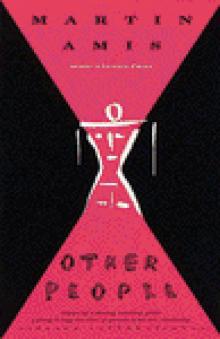 Other People
Other People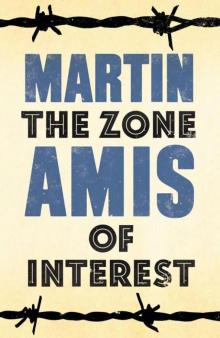 The Zone of Interest
The Zone of Interest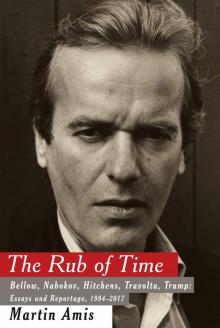 The Rub of Time: Bellow, Nabokov, Hitchens, Travolta, Trump
The Rub of Time: Bellow, Nabokov, Hitchens, Travolta, Trump Koba the Dread
Koba the Dread Success
Success London Fields
London Fields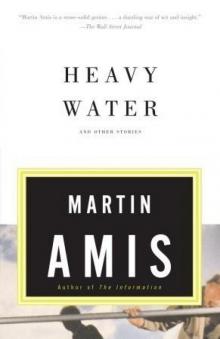 Heavy Water: And Other Stories
Heavy Water: And Other Stories Money
Money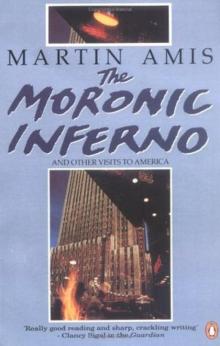 The Moronic Inferno and Other Visits to America
The Moronic Inferno and Other Visits to America Yellow Dog
Yellow Dog Time's Arrow
Time's Arrow Experience: A Memoir
Experience: A Memoir Einstein's Monsters
Einstein's Monsters The Pregnant Widow
The Pregnant Widow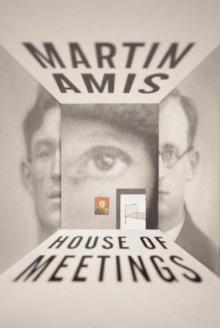 House of Meetings
House of Meetings The Information
The Information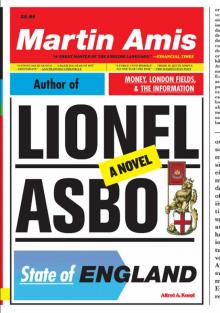 Lionel Asbo: State of England
Lionel Asbo: State of England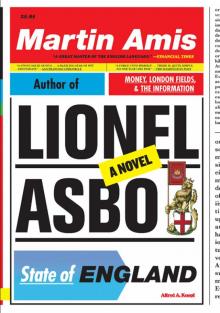 Lionel Asbo
Lionel Asbo Heavy Water and Other Stories
Heavy Water and Other Stories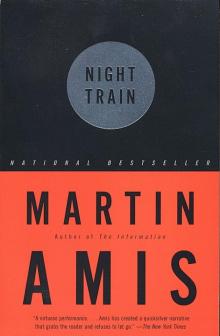 Night Train
Night Train Heavy Water
Heavy Water The War Against Cliche: Essays and Reviews 1971-2000 (Vintage International)
The War Against Cliche: Essays and Reviews 1971-2000 (Vintage International)